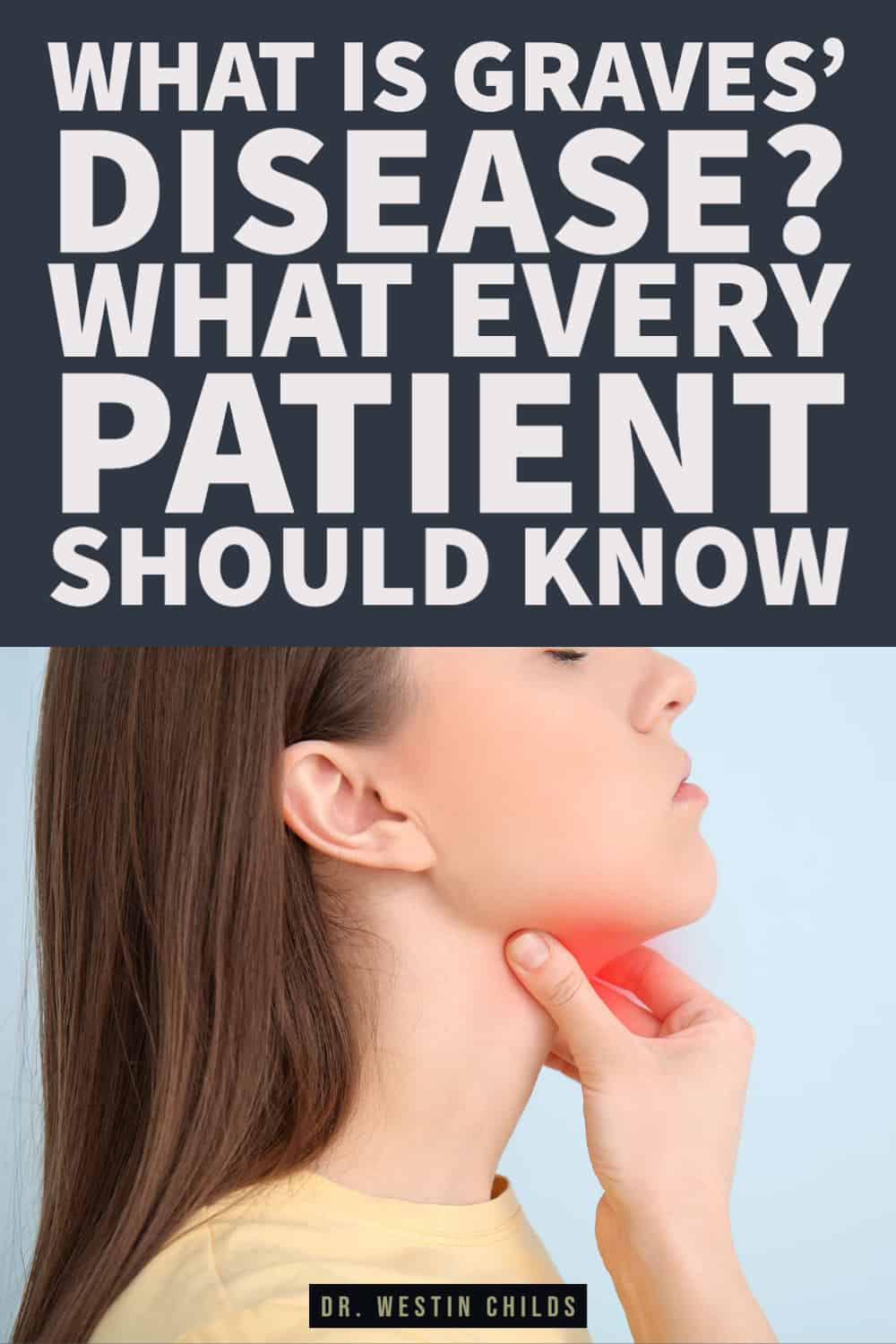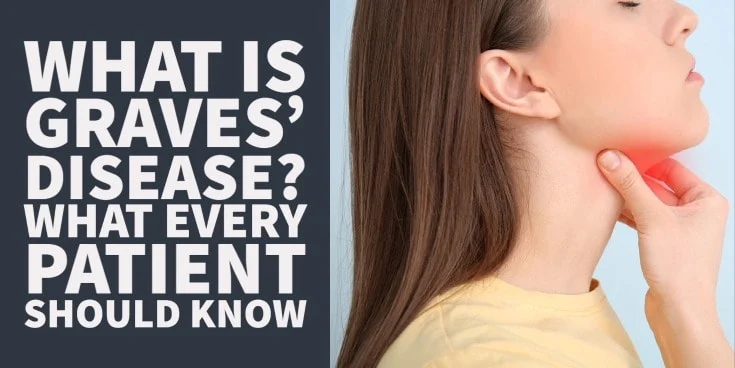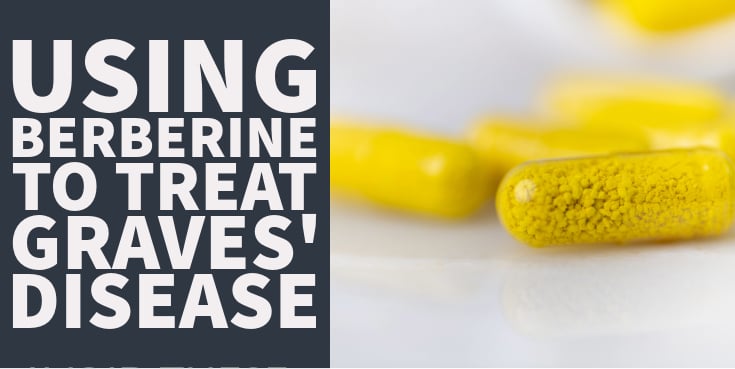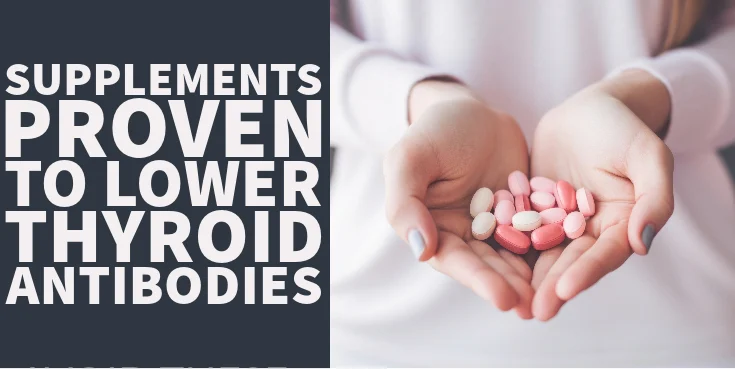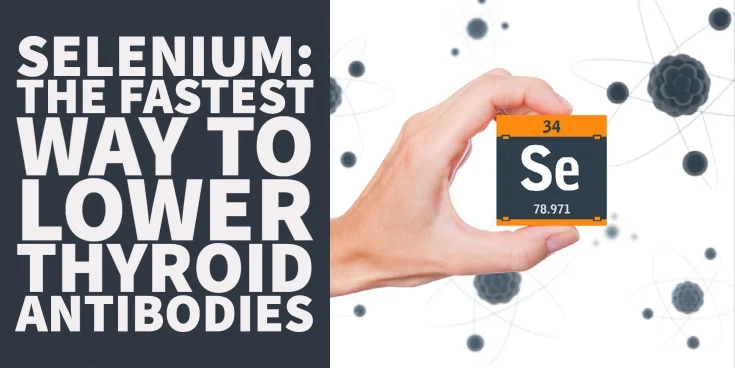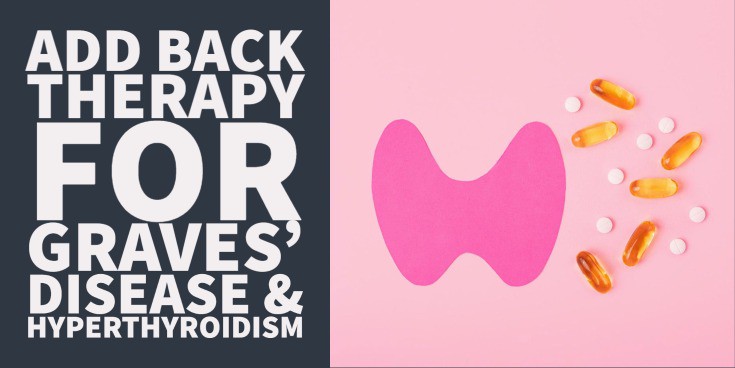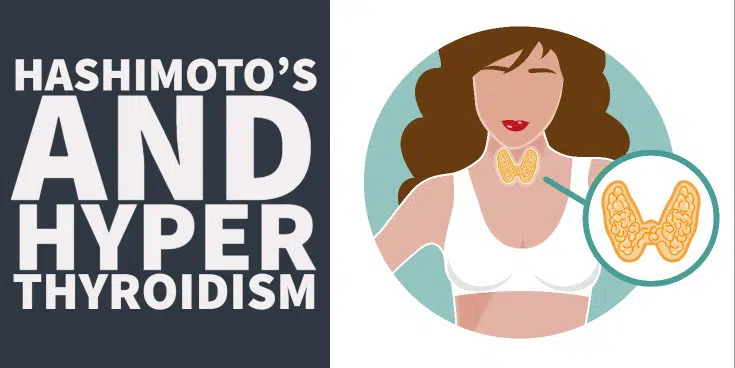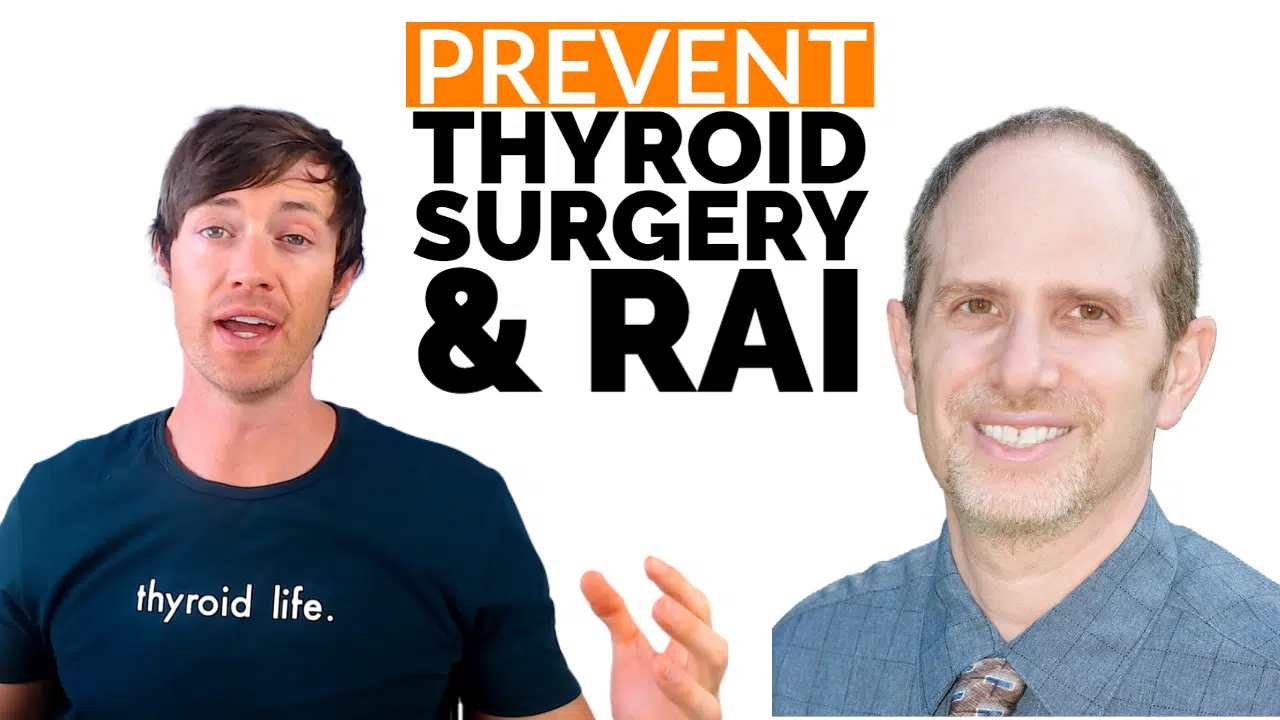What is Graves’ Disease?
Graves’ disease is a serious medical condition that will most likely be with you for the rest of your life.
And because it impacts your thyroid gland, the consequences of this disease will have a lasting impact on you and your health.
This article will help you to better understand your condition, how to live your best life DESPITE having it, the long-term consequences of this disease, how to look at your thyroid after treatment, and more.
I can’t begin to tell you how important understanding your condition is because standard doctors will not give you the information I am going to provide you with here.
And understanding this information could very well be the difference between thriving with your condition or letting it rule your life.
Let’s break this down so it’s easy to understand:
Graves’ disease is an autoimmune disease of the thyroid gland which results in a condition known as hyperthyroidism.
In Graves’ disease, your own immune system is attacking your thyroid gland and during this attack it causes your thyroid gland to produce EXTRA thyroid hormone.
This extra thyroid hormone that is produced during the immune attack causes a state known as hyperthyroidism.
Hyperthyroidism is just a way to describe how much thyroid hormone is in your body and it means you have TOO much in your system.
As your thyroid hormone levels rise you will start to experience the symptoms of hyperthyroidism but more on this below.
This part is pretty straightforward.
It gets tricky when we talk about treatment, the long-term outlook on your condition, and how to thrive in the face of your disease.
DOWNLOAD FREE RESOURCES
Foods to Avoid if you Have Thyroid Problems:
I’ve found that these 10 foods cause the most problems for thyroid patients. Learn which foods you should avoid if you have thyroid disease of any type.
The Complete List of Thyroid Lab tests:
The list includes optimal ranges, normal ranges, and the complete list of tests you need to diagnose and manage thyroid disease correctly!
What Causes Graves’ Disease?
It’s important that you understand that Graves’ disease is not JUST a thyroid disease.
In fact, it’s probably better to think of it as a disease of your immune system.
After all, your immune system is the thing that causes all of your thyroid problems (1).
If you can manage your immune system (and there are ways to do this) you can reduce the impact and damage that it is causing to your thyroid gland.
In this section, we are going to focus on the causes of Graves’ disease.
We don’t know exactly why each person develops Graves’ disease but we do know that there are certain triggers.
These triggers are sometimes within your control and sometimes they are not.
Examples of these triggers include:
- Infections, especially viral or bacterial – these infections (2) can cause problems with your immune system which then causes the development of antibodies to your thyroid gland.
- Genetics – you don’t have much control over your genetics but this seems to play a role.
- Gut or intestinal issues such as inflammation – Inflammatory conditions of the gut, as well as infections in the gut, can trigger immune dysregulation.
- Environmental factors – Exposure to chemicals and heavy metals (3) can trigger immune problems.
- Dietary causes – Certain foods can lead to inflammation and may even cause problems with your immune system. Foods such as gluten are known to do this.
- Nutrient exposure – Exposure to high doses of iodine has been shown to be associated with Graves (4).
If possible, you should always try to figure out what triggered your Graves’ disease.
It may not be possible, or it happened so long ago that you’ve forgotten, but spend some time here to see if you can figure it out.
Sometimes treating this cause can improve if not reverse your disease.
Symptoms of Graves’ Disease Explained
Because Graves’ disease impacts your thyroid system it can and will cause a diverse set of symptoms.
Your thyroid helps to manage, and even control, almost every system in the body.
This includes your hormones, cosmetic features such as your hair or nails, your weight, GI function, and more.
So it should come as no surprise that if you have Graves’ disease you will experience a wide array of symptoms that will come from nearly every part of your body.
And because Graves’ disease puts your body in a hyperthyroid state the symptoms tend to be associated with activation in all of these systems.
What do I mean?
Well, your thyroid helps to control your weight so if you turn up the dial on your metabolism then you can expect some weight loss.
And this is exactly what we see in people who have Graves’ disease.
Other symptoms of Graves’ disease include:
- Hair loss (dry and brittle hair)
- Diarrhea or increased bowel movements
- Tremors or trembling/shaking of the hands
- Anxiety or racing thoughts
- Rapid heart rate
- Chest pain
- Shortness of breath
- Weight loss (discussed above)
- Changes in your menstrual cycle and infertility
- Heat sensitivity (you will feel hot all of the time)
- Decreased energy
- Inability to sleep or insomnia
- Bulging eyes
These symptoms all indicate that your thyroid is in overdrive and that your body is producing too much thyroid hormone.
The good news is that ALL of these symptoms can be managed by simply managing your thyroid.
Treatments that are available to people who have Graves’ disease center on REDUCING or SLOWING down thyroid function and as this occurs you can expect your symptoms to resolve rather quickly.
Treatment Options and the Consequences (What Treatment Should you Choose?)
Just because treatment is relatively “easy” doesn’t mean that it is without consequence.
And this is something that you need to understand if you have Graves’ disease.
While it is relatively easy to slow down thyroid function in the body, it’s actually quite difficult to get it just right.
What do I mean?
Well, imagine that your thyroid system is pumping out too much thyroid hormone.
We can give this a numerical value just to make it easier to understand.
Let’s say that your thyroid is working at 150% of normal.
In this case, normal thyroid function would be considered to be 100%.
So if your thyroid is working as normal then you would have 100% of thyroid function.
But we know that people with Graves’ disease have MORE thyroid hormone than they need so we can represent their thyroid function as some value that is greater than 100%.
In this case, we know that your thyroid is working 50% more than it should normally so your thyroid function is at 150% of normal (meaning it is too high).
So how do you manage this problem?
Well, it would be easy to just drop down the value from 150% to 100% by reducing the production of thyroid hormone by 50%, right?
In theory that is true.
But let me tell you what actually happens in real life.
Because prescription medications are more like blunt instruments, it’s very difficult to slow down the thyroid by the amount that you want.
So as your doctor gives you anti-thyroid medication to slow down your thyroid function, your thyroid function drops BELOW the 100% you were aiming for.

Instead of dropping thyroid function from 150% to 100% your doctor accidentally drops your thyroid function from 150% to 75% of normal.
So instead of giving you normal thyroid function your doctor actually switched you from having too much thyroid hormone to having too little.
And this happens ALL of the time.
It’s one of the main reasons that people who have hyperthyroidism often complain of LOW THYROID symptoms (not high thyroid symptoms).
It’s because of this process.
With that as a backdrop, let’s talk about the specific therapies that are available to people who have Graves’ disease.
The most common therapy to use to manage high thyroid is anti-thyroid medication.
This medication literally blocks thyroid function and lowers thyroid hormone by brute force.
The most common medication used in the United States is a medication known as methimazole.
If you are taking methimazole then your doctor is forcing your thyroid function lower with this medication.
But anti-thyroid medication is NOT a long-term solution.
In fact, it’s well known that using anti-thyroid medication for a long period of time can and will cause many problems in the body.
So a more long-term solution for Graves’ disease is either one of two other options:
Option #1: Thyroid surgery to remove the entire gland (known as thyroidectomy).
AND/OR
Option #2: Radioactive iodine ablation therapy (the use of radioactive iodine to “kill” your thyroid gland).
These are both more long-term solutions compared to the use of anti-thyroid medications but they also can cause issues for people with Graves’.
All of the therapies used to treat Graves’ ultimately result in you becoming LOW thyroid and this point can be very confusing for many patients.
Just realize that if your thyroid has been removed or if it has been destroyed, you no longer have hyperthyroidism but instead, you now have hypothyroidism.
Graves’ Disease vs Hashimoto’s (and other Thyroid Diseases)
Graves’ disease and Hashimoto’s are really two sides of the same coin.
Both are autoimmune diseases that impact the thyroid but they differ in the antibodies produced and the long-term effect that they have on your thyroid gland.
Those people who have Graves’ typically have antibodies to something called the TSH receptor (known as thyrotropin antibodies).
But many patients with Graves’ can ALSO have positive antibodies to other parts of the thyroid including thyroglobulin antibodies and anti-TPO antibodies.
These antibodies result in HYPERTHYROIDISM in the long term.
But the exact opposite is true for women who have Hashimoto’s.
While Hashimoto’s is ANOTHER autoimmune disease of the thyroid gland, instead of causing HYPERTHYROIDISM these people develop HYPOTHYROIDISM.
So instead of having high thyroid (like those with Graves’) they actually have low thyroid.
And they typically only have antibodies to thyroglobulin and thyroid peroxidase.
But what’s interesting is that the triggers for both diseases are basically the same.
So whether or not you develop Graves’ disease or Hashimoto’s probably depends on your genetics and other factors we don’t quite yet understand.
Diagnosing Graves’ Disease
Compared to other thyroid diseases, diagnosing Graves’ disease is actually quite easy.
There are 3 main ways to do it:
#1. Thyroid lab tests.
The first and easiest step is to simply check thyroid hormone levels in your blood.
Because Graves’ is associated with high thyroid function you will typically see a SUPPRESSED or LOW TSH, a HIGH free T3, and ELEVATED thyroid antibodies.
This pattern is easy to identify and almost universally means that you have Graves’ disease.
#2. Thyroid Ultrasound.
You can also look directly at your thyroid gland using an ultrasound machine.
Ultrasound doesn’t give you a perfect picture of your gland but it’s great for identifying nodules.
These nodules can sometimes be the cause of hyperthyroidism and they can be evaluated with a biopsy (known as FNA).
#3. Radioactive Iodine Uptake (RAIU).
Lastly, you can also use radioactive iodine to see how active your gland is.
In this test, you are given radioactive iodine to see how much is taken up by your thyroid gland.
This is another useful tool to see what part of your thyroid gland is experiencing problems.
Is Graves’ Disease Fatal and What Should you Expect?
Graves’ disease is NOT a fatal disease!
Graves’ disease CAN cause a life-threatening condition known as thyroid storm but this is VERY rare.
Nowadays, it’s very uncommon for Graves’ disease to cause this condition (though it does happen from time to time).
But just because it isn’t fatal doesn’t mean that your outlook is necessarily good.
The problem that many people with Graves’ disease face is their long-term outlook.
You will definitely live, no doubt about it, but will you thrive?
And that’s the important question.
Almost all of the therapies used to treat Graves’ lead to a LOW thyroid state.
And this state is much more tricky to manage than a high thyroid state and leads to all of the exact opposite symptoms you experienced when you had Graves’ disease.
Believe it or not, the biggest problem people with hyperthyroidism face after treatment is usually weight gain.
This stems from inadequate treatment of their thyroid after it has either been removed or damaged.
Managing your thyroid function after treatment is VERY important and will determine how you feel in the long term.
If you spend time on my blog then you will find all sorts of resources designed to help you manage your thyroid after it has been ablated or removed with various types of thyroid medications, various types of supplements, and other therapies such as diet and exercise.
My advice is to spend some time and become well acquainted with these therapies as you cannot count on your doctor to help you with them.
Final Thoughts
Graves’ disease is an autoimmune disease of the thyroid gland which causes a hyperthyroid state.
Treatment is relatively easy but can lead to a different set of problems as your thyroid slows down.
The long-term outlook of Graves’ disease is very good but managing your quality of life afterward can be difficult.
Use the resources on my website to help guide you so you can live your best life!
Once you have been treated for Graves’ you will want to focus on therapies such as your diet, how much you exercise, the use of supplements, and the use of specific thyroid medications to get back to that optimal state.
Now I want to hear from you:
Are you suffering from Graves’ disease right now?
Where are you at in your treatment?
Are you taking methimazole? Have you already had your thyroid ablated or surgically removed?
How are you currently feeling and how are you holding up?
Leave your questions or comments below!
